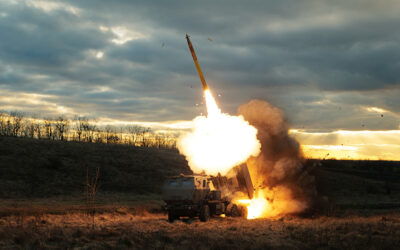
How Biden’s Reversal Could Change the War in Ukraine
SUBSCRIBER+ EXCLUSIVE – It may be President Biden’s most consequential decision about the Ukraine war since Russia’s February 2022 invasion: allowing Ukraine to strike Russian […] More
OPINION — The day before Britain declared war on Germany in August 1914, the Foreign Secretary Sir Edward Grey remarked to a friend that “the lamps are going out all over Europe”.
A few more lamps were extinguished last week, when Britain removed diplomatic status from a number of official Russian properties in the UK, put more restrictions on Russian diplomatic visas and expelled the Russian military attache Colonel Maxim Elovik.
Elovik is described as an “undeclared military intelligence officer”. That presumably means he works for the GRU, the organisation responsible for some of Russia’s most egregious overseas intelligence operations in recent years.
Those operations include the attempted murder Sergei Skripal in Salisbury in 2018. Skripal and his daughter survived the attack while Dawn Sturgess, who had nothing to do with Skripal but just happened to be in the wrong place at the wrong time, died after exposure to the poison (Novichok) that the Russians had been using. Based on reporting, It would appear that Elovik was in the Russian Embassy at the time of the Salisbury incident. It’s reasonable to assume he must have been at least suspected of being a GRU officer but was not expelled.
It’s not just for the President anymore. Are you getting your daily national security briefing? Subscriber+Members have exclusive access to the Open Source Collection Daily Brief, keeping you up to date on global events impacting national security. It pays to be a Subscriber+Member.
The normal terminology when an official is expelled for spying is to declare him or her “persona non grata” as a result of conducting “activities incompatible with diplomatic status”. Curiously, while Elovik has seemingly been “outed” as a spy, he is not accused of spying, and this terminology has not been used.
No grainy photographs have been released of Elovik having furtive meetings in Hyde Park or collecting small packages concealed in the cistern of a public lavatory. The British government says Elovik is being expelled, not for anything he has done in particular but for being part of the Russian intelligence apparatus here in the UK.
It is the apparatus that is being challenged.
It has presumably been known for years that the Russians will use any official premise, giving their spies the protection against arrest and imprisonment that diplomatic immunity provides, to conduct intelligence activities.
During the Cold War, and for most of the period since 1991, Russia and the west spied against each other, often but not always using diplomatic cover, and this activity was tolerated on both sides. Spying was generally kept separate from whatever was going on between Russia and the west politically and diplomatically, and care was generally taken to keep it that way.
At the same time, while it was realised that spying could do real damage to the other side – giving them military, intelligence or political knowledge they really shouldn’t have; giving them covert influence; etc – the consequences were believed to be manageable and did not need to be discussed in polite society.
Subscriber+Members have a higher level of access to Cipher Brief Expert Perspectives and get exclusive access to The Dead Drop, the best national security gossip publication, if we do say so ourselves. Find out what you’re missing. Upgrade your access to Subscriber+ now.
But now, British actions suggest that Russian intelligence operations are getting harder to manage. So, no, the British are not reacting to Col. Elovik trying to bribe some hapless junior official at the Defence Ministry to hand over secret intelligence. There is no suggestion that he has done anything of the sort. They are reacting more broadly to “a pattern of malign activity” by Russian intelligence.
They cite cyberattacks designed not just to steal information but to damage our infrastructure, our trade and the working of a think tank – ie, interfering with our democratic processes.
The Russians have been recruiting agents with the presumed intention, again, not of stealing information, but of threatening perceived opponents. And it is not just activities in the UK that the British government complains about; Russian intelligence activities, the UK says, on mainland Europe have been designed to disrupt the provision of European support for Ukraine in its attempt to defend itself against illegal Russian aggression.
This is a sign of lamps going out.
We are not looking at a “normal” response to a “normal” bit of Russian spying that might be a Russian diplomat or military officer caught red handed and booted out of the country followed by indignant Russian denials and the booting out of a British diplomat or military attache in Moscow ending ultimately with everyone happy and getting back to work.
We are instead looking at the British saying that the Russian gloves are off, that the Russians are fighting across a range of fronts and that an unusual response is required.
That response, over here, has the wholehearted support of the political opposition Labour Party. What will the Russians do?
They have already claimed injured innocence, wicked British disinformation etc. and presumably there will be expulsions and other reprisals against the British Embassy in Moscow. Then what? Will the British action halt the Russians in their tracks?
I suspect this fight is going to get dirtier.
The Cipher Brief is committed to publishing a range of perspectives on national security issues submitted by deeply experienced national security professionals. Opinions expressed are those of the author and do not represent the views or opinions of The Cipher Brief.
Have a perspective to share based on your experience in the national security field? Send it to [email protected] for publication consideration.
Read more expert-driven national security insights, perspective and analysis in The Cipher Brief because National Security is Everyone’s Business.
Related Articles

SUBSCRIBER+ EXCLUSIVE – It may be President Biden’s most consequential decision about the Ukraine war since Russia’s February 2022 invasion: allowing Ukraine to strike Russian […] More

SUBSCRIBER+ EXCLUSIVE REPORTING — It’s one of the stranger economic realities of the war in Ukraine: Ukraine is still earning $800 million a year shipping […] More
Search